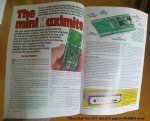.... but it could still snare many young people like those whose attention was captured by the devices of several decades ago, and that would further the goals of the foundation.
I fully agree with that, we need more programmers !.
I've never said I don't like the pi, just that I don't think it's right for the education market.
It is a very cost effective platform, and if it captures the attention of a new generation of programmers then I'm all for it.
But the pocket money price and open architecture aspects are a double edged sword.
A pound or two more and it could have a decent case, with space for batteries, and the rather cute logo printed on top.
How many of us PICAXE people forget to make a backup of a .bas file ?.
What will it be like if you needed to keep a backup, on a separate SD, of your firmware and OS as well ?.
( At least you only lose your work with the PICAXE architecture. )
The aims of the foundation are sound.
I remember showing my Mum and Dad how I'd programmed my MK14 to play 'We wish you a Merry Christmas', and a little later showing my 12 year old cousin 'Lemonade Stand' on the Apple ][.
I went on to be an industrial programmer, and my cousin is now a senior software bod at a major bank.
If pi means that in a year or two some 14 year old is going to plug a little box into his telly and show his Mum and Dad the ( modern day equivalent of ) 'Battlezone' or 'Visicalc' that he's written from scratch, then the foundation will have succeeded.
I just think that pi needs to be a bit more robust for the educational market.


